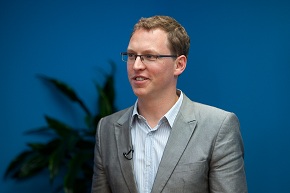Huddle co-founder and CEO Alastair Mitchell talks about the simplicity of cloud-based collaboration, the technology that came before, and resurrecting dead content.
The application service provider (ASP) model was a buzz in the dot com era as businesses looked for ways to reduce costs, and although it failed to hit the heights promised it did set the platform for cloud computing when advancements in technology made it possible.

The ASP model saw companies put software in a datacentre rather than on individual machines. Users would then access the software via a connection on their computer. The arrival of new technology such as virtualisation, offering on-demand services with highly elastic payment models, meant cloud computing quickly undermined ASPs. But business users were now au fait with the concept of not having software on their own hardware nor supported by their own engineers.
One company which learned from the ASP model to become a pure cloud offering is Huddle. The firm was set up in London four years ago to offer collaboration in the cloud. Customers get a secure space in the cloud where they can store content and enable other people to share and work with them.
The company has already gained $40m in funding and has thousands of business and public sector customers. Employees of over 100,000 companies are using Huddle to collaborate with major UK and US government customers as well as with corporates, including National Grid, Procter & Gamble, O2 and Everything Everywhere.
The service costs about £15 per user per month.
Before Huddle, Mitchell set up two separate ASPs, which failed to become successful businesses.
"In those days everyone ran their own kit – little clouds. In one of the ASPs I set up the box that we owned and ran that sat in the corner of the office - it cost more than the whole cost of Huddle's first year of operation."
He says the multi-tenancy and elasticity of the cloud makes it a far cry from the ASP model.
"There is a big difference between cloud and ASP, and collaboration is one of those markets where the true cloud is ideal - [cloud] revolutionises it."
But there is still a lot of confusion, he says: "Many corporates still think the cloud is another datacentre where they stick things."
But the Huddle concept is simple, says Mitchell: "In our social lives we are using Facebook to share things and we thought there must be an enterprise way of doing this so we decided to build it."
While on the board of Dunnhumby - the retail customer analytics firm now owned by Tesco - Mitchell saw the millions of pounds being spent on Microsoft collaboration software SharePoint and grew frustrated by the lack of staff making use of it. At this point that he started developing the Huddle concept.
"Huddle is replacing SharePoint with a single system in the cloud that everybody can use," says Mitchell. "There are groups of people working on content together securely in the cloud."
When Tesco acquired Dunnhumby, which had created the supermarket's loyalty reward card, Mitchell used the capital he gained to set up Huddle, along with Andy McLoughlin. "It is inconceivable that something like Facebook, that allows you to share things, does not exist in the corporate world," he says.
"Corporates have stuff all over the place and it is difficult to collaborate on it. We store stuff on our phones, our email, our iPads, desktops, laptops, servers and more. Huddle replaces this."
The productivity benefits are gained through easy access to resources, he says.
"Organisations are saying, 'The enterprise cloud is here and we want to move from on-premise to the cloud and we want to do a several things in that move such as enable people to work together and share things and we want to get rid of the idea that content is disparate'."
Huddle has all the cost benefits of the cloud. It removes the need for hardware to host systems, cuts licensing costs by providing monthly subscriptions, and means internal resources are not required to maintain the software. Updates are automatic requiring no in-house work. But Mitchell says the biggest benefit is "turning dead content into knowledge."
Because content is being created and replicated across in-house systems, it is hard to find – having it in the cloud in one place means it's easy to find. This is also essential in reducing storage requirements - large firms store petabytes of content and data volumes grow at a rapid rate.
Mitchell says the public sector has been the biggest success for the company. For example, over 80% of sales in the first month in the government's G-Cloud app store were Huddle licences. Mitchell says for similar reasons the financial services industry is beginning to take up the service.
"We have more and more banking and financial services customers - it's very similar to the problems we solve for government customers. They are really analogous. Banking like government cares a lot about security and creates a lot of content."
Consumerisation is helping drive the take-up of Huddle with workers opening accounts and using it themselves.
"The way it normally works is someone in a company uses it and from there it grows through the consumerisation of the enterprise," says Mitchell. He adds that Apple also uses the software to showcase collaboration because it makes an iPad more compelling.





